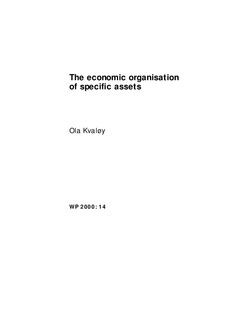The economic organisation of specific assets
Abstract
In the international offshore industry we find that the oil companies and their main suppliers usually operate with separate ownership. But the main contractors manage a capital stock, and produce inputs, that are highly specific to the oil companies. Within the traditional theory of the firm this organizational solution emerges as a puzzle. Asset specificity is usually considered as an argument for vertical integration. The idea is that integration reduces the problem of opportunistic behaviour. In this article I show that asset specificity actually can be an argument for separate ownership. While an integrated supplier considers the asset specificity as unimportant for his strategic behaviour, disintegrated parties find that a high degree of specificity makes opportunistic behaviour less profitable than if the assets enjoyed a low degree of specificity. Asset specificity can thus function as a buffer against opportunistic behaviour. This buffer can create room for strong incentive schemes.
Publisher
Chr. Michelsen InstituteSeries
CMI Working paperWP 2000: 14
